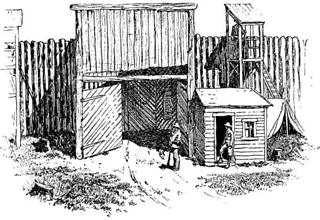ANDERSONVILLE
We had little time for thought before a round-shouldered, blustering little man upon a white horse rode the length of the train, and with many a curse and oath ordered us all out. During our exit from the close, cramped quarters we had occupied so long a fresh guard came, in the wildest confusion and unmilitary order, from the direction of the smoke, and after much blustering and more cursing we were formed into two lines, giving room for us to pass between, four deep. After some more swearing the officer on the white horse placed himself at the head of the column and ordered us to march. This was Wirz, our prison-keeper, and unhappily our first introduction to him was not our last. Upon reaching the inclosure we halted while a part of our number were formed into a detachment, and the remainder were ordered to be placed upon the rolls of the older detachments already in the pen.
 I have hesitated
thus far to pronounce the word Andersonville. We knew nothing, or had heard
nothing, of the place, so we had not a moment's notice of the life we were
about to enter upon. These many years after, the word "Andersonville"
excites the same curiosity that it did before we entered upon the months of
suffering that cannot be told. This, then, was Andersonville, or, as it was
called by the guard, " Camp Sumpter." We entered it by a swinging door or
gate, large, heavily ironed, and guarded.
I have hesitated
thus far to pronounce the word Andersonville. We knew nothing, or had heard
nothing, of the place, so we had not a moment's notice of the life we were
about to enter upon. These many years after, the word "Andersonville"
excites the same curiosity that it did before we entered upon the months of
suffering that cannot be told. This, then, was Andersonville, or, as it was
called by the guard, " Camp Sumpter." We entered it by a swinging door or
gate, large, heavily ironed, and guarded.
As we passed within the doors were closed behind and heavily barred—closed upon me for five long months, and upon one-half our number for life. Our hearts sickened as we first looked upon the misery before our eyes. The attempt to picture our mental depression, as we took in, with one quick, swift glance, the condition of those who had entered before us, would be futile.
We joined inside the inclosure, thirteen thousand of our comrades in arms, but they were not to be recognized. They seemed a different race of the human family, and vastly more squalid than any I ever had seen or heard of—emaciated forms, half human and half spectral, black with filth and smoke, and swarming with vermin. As we were driven like sheep into the stockade they crowded about us, making inquiries faster than they could be answered.
I think we were the first detachment of fresh prisoners that had reached Andersonville for two or three months. Those that we met there were immigrants from Belle Isle, Libby, and Danville, and all of them prisoners of from three to sixteen months' experience.
For convenience in drawing rations and being counted each morning they had been divided into detachments of two hundred and seventy men each, and one of their own non-commissioned officers placed over each company. Each detachment was subdivided into sections of ninety men, with a non-commissioned officer over each, but we found the numbers of the detachments diminished fully one-third by deaths. I was placed in one of the old detachments, together with a number of my more intimate comrades—"Detachment 13, Squad 3."